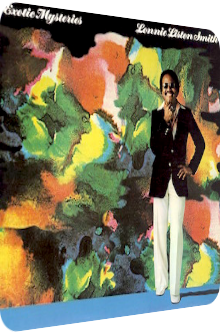
Lonnie Liston Smith
Exotic Mysteries
1978
When Exotica is on the decline in the middle of the 60’s, it is slowly assimilated by big band orchestras playing Funk and Disco, two distinct genres that can be proudly called genres, whereas Exotica is just a style or way of life. Meh. Big bands themselves are then slowly forced out of the scene due to the increasing amount of electronic devices whose synthesized drums and strings become more realistic and life-like. Again: meh. This tendency has to be kept in mind all the time when an Exotica fan ventures into the 70’s where there’s less vintage material and more fusion fractals. Enter Exotic Mysteries by pianist, trumpeter and composer Lonnie Liston Smith (born 1940), a Funk fanatic and purveyor of gorgeously textured arrangements. Harboring eight tracks, recorded in New York and released in 1978 on CBS Records, Exotic Mysteries funnels kaleidoscopic pipe dreams of vocal-based and instrumental pieces, the majority of them slowly paced and cozy.
Exotic percussion is as important a part of the album’s characteristics as the occasional field recording, electric piano and smooth saxophone. From the outset, this is not what a vintage Exotica fan has in mind, I’m aware of this, but Exotic Mysteries is still unexpectedly great and shares many a timbre, hue and pattern with the Golden Age. Featuring the talent of vocalist, flutist, saxophonist and brother Donald Smith, second flutist and saxophonist David Hubbard, percussionist Steve Thornton, drummer Lino Reyes and guitarists Marcus & Ronald D. Miller, Lonnie Liston Smith creates a surreal jungle, an oasis of peace and contemplation which is worth a closer inspection.
You don’t have to believe in Funk music to admire Lonnie Liston Smith’s multifaceted opener Space Princess, a longform piece of a whopping seven minutes launching in medias res, with all the archetypal brass stabs, cowbells and electric guitars as well as their wah wah brethren already firmly in place. The Exotica vibe is still somewhat entangled in this piece, I’m not kidding anyone, although it is of course updated to resemble the glamorous Miami vibe that became so essential for a major part of that 80’s culture. Donald Smith truly shines in the helicoidal array of emerald electronics and the glacial-glaucous globs of L.L. Smith’s electric piano sparks. A female backing choir, the bedazzling punctilio of a sun-lit Samba section and mauve-tinted Disco strings round off the coruscating aura of a cosmic shanty full of analog warmth, euphonious hydrazine and, yes, exotic entities.
The adjacent Quiet Moments is a gorgeously laid-back instrumental and even more paradisiac. Simmering strings, sunset pianos, lush bongos and the verdured howls of the cuíca evoke an insouciant crimson sphere. Easy Listening, Exotica and soft Funk meet in this very mélange. While Magical Journey surprises with its sophisticated pre-Breakbeat fusillade of serrated drums, glittering electric pianos and jazzy alterations amidst the bokeh of guitars, the album’s title track Exotic Mysteries rounds off side A in the utmost dreamiest fashion. David Hubbard’s susurrant alto flutes meanders through the viridian cannelure of downwards spiraling glissando cataracts, the duality of an earthbound sanctuary and twilight zone is luring and moony. The 60’s vibe of Exotica is successfully transformed into the late 70’s once more.
Side B opens with Singing For Love, an admittedly cheesy title whose actual soundscape, however, turns out to be easygoing and carefree. In lieu of an uplifting Funk tunnel vision, the elasticized beat is much more soothing. Donald Smith is deeply embedded within the backing vox, his velveteen performance is still not meant for everyone, especially as the soft hue of the arrangement could have worked really well as an instrumental. Obviously the vocals are tightly integrated into the accompaniment, but the la-dee-da lyrics about rainbows are meaningless and apocryphal, a sarcastic person would probably say: it’s too poppy.
Mystical Dreamer (A Tribute To Miles Davis) is a much better choon supercharged with enigmatic electric piano fibers, aggrandized afterglows and David Hubbard’s softened soprano saxophone in the epicenter. The physiognomy of the piece reminds of Singing For Love, but now that there are any vocals left, one can absorb the interplay between sound, sustain and silence. A syringa piece where textures and moods are everything. The little intermission Twilight meanwhile surprises with a synthetic field recording of tropical birds, crickets and other animals that find themselves in a rain forest of wind chimes and complaisant piano trickles, whereas the grand finale Night Flower takes over the rufescent atmosphere and embeds it into a galactic-rhizomatic downbeat reticulation that is fueled by Hubbard’s sax and Donald Smith’s vanillarific flute washes of the jungular kind. A benthic endpoint of a great album.
There is no denial: calling Lonnie Liston Smith’s Exotic Mysteries an Exotica album just because of the incidental appearance of a certain trigger in its title would be a bit far-fetched. However, once the actual soundscapes reach the ear of the connoisseur, delight ensues, provided that a bit of Funk and an array of electronic devices does not kill the mood entirely. Similar to saxophonist John Klemmer’s gorgeous coppice Brazilia (1979) and its battery of strings, drums and Batucada vestiges, Lonnie Liston Smith provides a wadded yet air-permeable thicket of green trees and horticultural peripheries. The tempo is a bit slower, the vocals not everyone’s cup of tea all the time, but the – accidental or not – genuflection before comparatively elaborate jazzy riffs and wondrously enchanting textures make Exotic Mysteries a hidden gem among the post-Exotica phase.
The various glitters, cowbells, congas and Brazilian devices cause a fluorescent glow and make for a great listening experience loaded with diffractive aureoles and oneiric instances. The album is still not overproduced, at least not to my ears, as quiescent moments, veiled vignettes and field recordings unfold peacefully rather than forcefully. At the end, one has to question Lonnie Liston Smith’s passion for Exotica in the true sense of the word, and many an integrated ingredient is only added as an ornament in order to link back to the album’s title, but since Smith’s other works have much in common with the nucleic cotyledon that makes up Exotic Mysteries, chances are that the open-minded Exotica fan will find similar pleasure. Exotic Mysteries is available on vinyl and has been reissued on CD where it is coupled with Smith’s similarly gorgeous and exotic Loveland.
Exotica Review 442: Lonnie Liston Smith – Exotic Mysteries (1978). Originally published on Jul. 18, 2015 at AmbientExotica.com.
